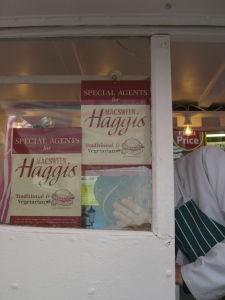
Strolling through the Notting Hill market during my recent trip to London, I did not see Hugh Grant or Julia Roberts. I did, however, see a sign in a butcher’s stall for haggis. I had to take a picture of the sign. Then I peered around to the front of the stall to see if there actually was haggis for sale. Well, lo and behold, there it was.
I had to buy it. Discovering that the two-slice package cost just one pound, I had to buy two. I told the butcher that my husband has been threatening for years to make haggis. The butcher laughed, “That’s quite a threat.” He sold me the haggis, assuring me that it would be fine for the flight home. And it was. I…..um…..did not declare it when I went through customs. (It was hermetically sealed. It was fine.) Come to find out, though, that until 2010 haggis was not permitted to come into the country. It may have had something to do with mad cow disease, or perhaps U.S. Customs decided that we just have certain aesthetic standards to uphold.

John was delighted with my gift to him. For all his culinary threats, he had never actually tasted haggis before. So now he has. As have I. It’s basically Scottish scrapple. He loves it. I am happy for him.
And who knew there were so many ways to serve it? According to the serving suggestions on the package, it is not only great as an accompaniment to bacon and eggs (although a bit redundant), it makes a great topper on baked potatoes, or for lunch served on a hamburger bun. The inside label contains the MacSween Original Award Winning Recipe for Haggis Nachos. Who knew haggis was so versatile?
For those uninitiated folk who are wondering what the heck haggis is, I offer the ingredients list from the MacSween (Guardians of Scotland’s National Dish) Haggis package: lamb offal, beef fat, oatmeal, water, onion, salt, pepper, spices. Except for that first ingredient, it sounds pretty tame.
Offal. Hmm…a little foray into denotation and conotation is in order. According to the Meriam-Webster dictionary, offal is “the waste or by-product of a process, esp. the viscera and trimmings of a butchered animal removed in dressing.” That would sound an “awful” like what goes into scrapple or hotdogs. According to our in-house haggis researcher John, the MacSween company would probably narrow that down to organ meats such as heart, liver, and lungs. Americans throw that stuff away, but the rest of the world does eat it. Anything that sounds that awful and is pronounced as such gets a bit of a negative connotation on this side of the Pond.
Ah, but haggis is what makes Scotland great. (I know I was in England, but so were the Greeks, the Arabs, the Poles, the Irish, the French, and every one else on the planet.) Haggis is so important to the Scots (and there are six million people of Scottish descent in the U.S., including the Hereford Zone), that the famous Scot poet Robert Burns wrote a poem about it. Bear with me as we get literary…
Address To A Haggis
Fair full your honest, jolly face,
Great chieftain of the sausage race!
Above them all you take your place,
Stomach, tripe, or intestines:
Well are you worthy of a grace
As long as my arm.
(The rhymes work better in the original version, but you can get a feel for it nonetheless. After some delightful verses about buttocks, “gushing entrails bright,” and swollen bellies, Burns goes on to compare the pathetic food that the “Master of the house” eats to the hearty haggis that the clearly superior rustic Scotch labourer eats…)
Poor devil! see him over his trash,
As feeble as a withered rush,
His thin legs a good whip-lash,
His fist a nut;
Through bloody flood or field to dash,
O how unfit.
But mark the Rustic, haggis-fed,
The trembling earth resounds his tread,
Clap in his ample fist a blade,
He will make it whistle;
And legs, and arms, and heads will crop
Like tops of thistle.
You powers, who make mankind your care,
And dish them out their bill of fare,
Old Scotland want no watery ware,
That splashes in small wooden dishes;
But if you wish her grateful prayer,
Give her a haggis!
This should really be read with a hearty voice and a Scottish accent, preferably with a glass of single malt in hand.
If you want to read the full poem, I direct you to http://www.worldburnsclub.com/poems/translations/address_t0_a_haggis.htm



Leave a comment